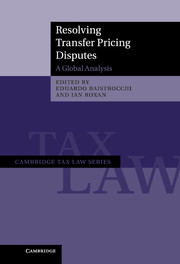Book contents
- Frontmatter
- Contents
- List of figures
- List of tables
- List of contributors
- Acknowledgements
- The Golden Bridge: analytical table of cases by topics in the OECD Guidelines
- Table of Cases
- Abbreviations
- Part I The context of transfer pricing disputes
- Part II North America and Europe
- Part III Asia Pacific
- Part IV BRIC Countries
- 13 Transfer pricing disputes in Brazil
- 14 Transfer pricing disputes in the Russian Federation
- 15 Transfer pricing disputes in India
- 16 Transfer pricing disputes in China
- Part V South America, Middle East and Africa
- Part VI Conclusion
- Index
- References
13 - Transfer pricing disputes in Brazil
from Part IV - BRIC Countries
Published online by Cambridge University Press: 05 November 2014
- Frontmatter
- Contents
- List of figures
- List of tables
- List of contributors
- Acknowledgements
- The Golden Bridge: analytical table of cases by topics in the OECD Guidelines
- Table of Cases
- Abbreviations
- Part I The context of transfer pricing disputes
- Part II North America and Europe
- Part III Asia Pacific
- Part IV BRIC Countries
- 13 Transfer pricing disputes in Brazil
- 14 Transfer pricing disputes in the Russian Federation
- 15 Transfer pricing disputes in India
- 16 Transfer pricing disputes in China
- Part V South America, Middle East and Africa
- Part VI Conclusion
- Index
- References
Summary
Introduction
The objective of this chapter is to discuss the development of transfer pricing legislation in Brazil, analysing the law as well as the leading cases on transfer pricing disputes. It is important to keep in mind that the Brazilian transfer pricing legislation was enacted only in 1996 (Law no. 9.430/96). Since its enactment, there have been significant changes in the Law, fiscal authorities' interpretation and courts' decisions. This signifies that Brazilian transfer pricing rules are evolving gradually. However, there are still significant deviations between the Brazilian transfer pricing law and the arm's length principle. The arguments presented in this chapter will demonstrate that further reforms are necessary if Brazil wants to adopt rules that are closer to the international standard implemented by the OECD's member countries.
This chapter is structured as follows: (i) the economic context; (ii) the historical background of transfer pricing legislation; (iii) the main aspects of the Brazilian transfer pricing legislation; (iv) the domestic approach to transfer pricing disputes; (v) administrative procedures to minimise transfer pricing disputes; (vi) bilateral and multilateral approaches to transfer pricing disputes; (vii) recent developments in the Law; (viii) concluding remarks. Sections 13.3, 13.4 will present the economic context, historical background and the main aspects of the Brazilian transfer pricing legislation. Section 13.5 will present some leading cases on transfer pricing disputes. Sections 13.6 and 13.7 will discuss the administrative procedures adopted to minimise transfer pricing litigation, including the feasibility of adopting the advanced pricing agreement (APA) or implementing a mutual agreement procedure (MAP) through double taxation conventions (DTCs). Section 13.8 will briefly analyse the recent changes introduced by Provisory Measures no. 472/09 and 478/09 and whether they reduced the gap between the Brazilian legislation and the international standard. Last, in section 13.9, we will conclude by demonstrating the importance of further adjustments in the Brazilian transfer pricing legislation in order to converge to the international standard, i.e. arm's length principle.
- Type
- Chapter
- Information
- Resolving Transfer Pricing DisputesA Global Analysis, pp. 519 - 554Publisher: Cambridge University PressPrint publication year: 2012
References
- 1
- Cited by

